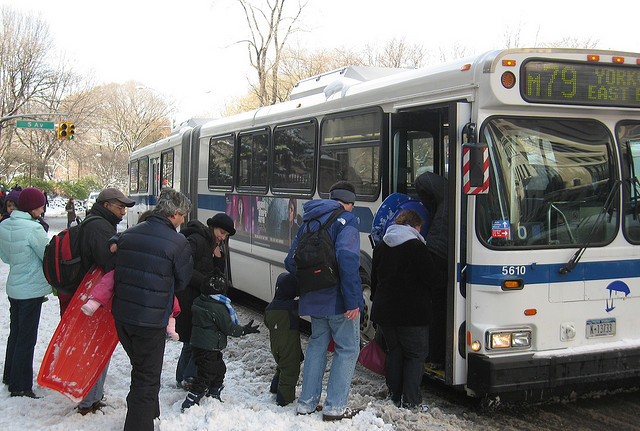
The slowest bus in New York City is the M79, and the least reliable is the local M15, according to the Straphangers Campaign and Transportation Alternatives, which today awarded these two routes the "uncoveted" Pokey and Schleppie awards, respectively.
On weekdays at noon, Straphangers measured the crosstown M79 at an average speed of 3.2 miles per hour, slower than many people walk. On the M15 local, meanwhile, 33 percent of buses don't arrive anywhere close to the posted schedule, meaning they're either bunched tightly together or spread far apart, forcing riders to wait.
The Pokey and Schleppie call attention each year to bus service that gets bogged down by city traffic or delays caused by an inefficient fare payment system. Usually, it's the bus routes with the most passengers that rank lowest in terms of speed and reliability, because they tend to travel on highly trafficked streets and spend a lot of time stopped as people pay to board.
The M15 local has some of the highest ridership of any local route in Manhattan, and the bus routes that Straphangers and TA singled out for poor performance in the Bronx, Brooklyn, Queens, and Staten Island (the Bx19, Bx15, B41, B44, Q58, S48/98, and S78) all have a lot of passengers relative to most other routes in those boroughs. (With about 17,000 average weekday trips, the M79 has substantial but not exceptional ridership for Manhattan.) The takeaway is that the most important bus routes in the city tend to perform the worst for transit riders.
One clear solution, Straphangers and TA point out, is to extend Select Bus Service features like dedicated transit lanes and off-board fare collection to more routes. Mayor de Blasio has pledged to bring "world-class" bus rapid transit to New York, with 13 new routes in four years, and the recent MTA Reinvention Commission report suggested that non-SBS routes should also get off-board fare collection to improve speed and reliability.
SBS features have significantly sped up buses and attracted new riders on several routes, but the unreliability of the M15 and B44 -- both operating in exclusive bus lanes along much of their routes -- suggests more can be done to improve these bus lines. Double-parked vehicles can still obstruct the city's bus lanes; passengers on local buses along SBS routes still pay when they board; and passenger confusion about which buses are local and which are "Select" may be having an effect as well. Thanks to Staten Island pols, SBS buses no longer have flashing blue lights to help riders distinguish between the two.





